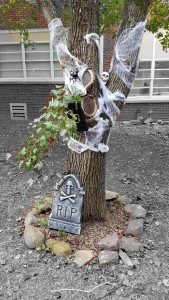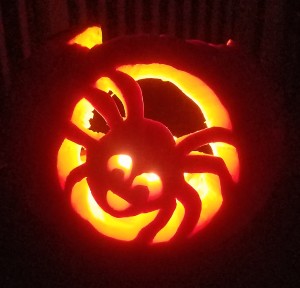Welcome to the Spot Writers. This month’s prompt is to use the following words or images in a story: whirlwind of leaves, wizened old man, lonely call of an owl, crackling fire.
Me Time
By Val Muller
There he stood, in the strip mall in front of Tropical Palms Spa. His skin tingled from his facial, and his muscles were so relaxed he could melt. He sighed and glanced back at the neon palm tree in the window. Of course, there was nothing tropical about it, it being located in the middle of Hudson, Ohio. But that was the point, to go somewhere away from it all. Near a national park, it was a good place to get lost.
And getting lost was easy to do. He’d taken his doctor’s advice and started Intermittent Fasting, eating only during an eight-hour window each day. Gone were the days of keeping gingerbread cookies at the ready, eating one practically every five minutes. Without the chill of his wintry abode, he didn’t need that much insulation anymore, and the extra weight was bad for his knees.
He wondered if his wife would even recognize him after his sabbatical. He’d lost countless pounds and dropped so many pant sizes that he could wrap himself in his old clothes threefold. His energy had increased, just like the doctor said it would. He went for walks now, long walks, wondering how in the world he used to conquer all those lists and deadlines.
The checking once, twice; the playing moral judge. It had all been so taxing, so ubiquitous, so constant. Who was he to determine naughty or nice? His therapist was right: it was time for parents to start looking after their own children’s behaviors. Santa needed to look after Santa.
His elves, he’d sent off to a holiday in the tropics. The coconuts and rum would be good for them; after all, they lived on carbs. They would be back just after Thanksgiving. That would be plenty of time for them to run maintenance on COAL 2.0, the new program the rep installed. It was a fully-automated system that assigned kids gifts or punishments based on algorithm.
It scanned their parents’ social media posts, monitored phone conversations with grandparents and friends, even tapped into school security cameras and data from the NSA. In mid-December, it spit out a list of kids good, bad, and neutral. Then, it assigned one of a small range of toys—about twelve possible options, including rocks for punishment (coal was not environmentally sustainable)—based on age and behavior.
There was really nothing Santa needed to do. The program sent the gifts to homes via drone delivery. He could still ride on his sled, but the ride would be mere ceremony. He would be back in time to catch a Christmas movie with the missus while enjoying a hot chocolate (if it was still during his 8-hour feeding, and not fasting, window).
He stepped off the curb, and a whirlwind of leaves swirled from the side of the parking lot onto the sidewalk, surrounding him and playing with the stubble on his clean-shaven whiskers. The cold made his face, fresh with the facial, tingle. He shivered, for a moment missing his plush red robe. He heard the lonely call of an owl and turned around. The lot was largely deserted, it being the middle of an October work week, and he examined the Halloween décor in the windows.
He envied Halloween. It was everyone’s job to give out candy. And that, said his therapist, is how it should be. The world had no right to demand a single entity be responsible for billions of toys each year. That was too much for any man. A flashy jack-o-lantern in the window mocked him with its smug confidence.
He gritted his teeth and reached for a cookie, but there were none, of course. The therapist had blamed sugar—in part—for the Breakdown. Santa sighed and noticed a Costco across the street. He couldn’t help himself. He’d been working on thinking of himself and his wife only—as his therapist directed—but his mind naturally went to buying in bulk. He would just take a peek.
Inside, the store was already decorated for Christmas. They must have sold out of their Halloween items long before October 1. Sparkling colored LED lights on magnificent plastic trees. His body—his old body, the fat one, the one before his recovery—in miniature, carrying a heavy sack, standing on a mirrored music box. And Christmas cookies. A box with 96 of them for $8.99. He smiled, remembering the good old days and how that box would make a nice midnight snack. He reached in his pocket and fingered the ten-dollar bill. Crisp, but not as crisp as those cookies looked.
And then he heard the pitter-patter of children. A check of his watch let him know school must have been let out. The kids ran up the aisle examining the Christmas wonder. A little boy—that was little Timmy from Twinsburg—was pushing his little brother (Joey—he was such a good little boy) to get a closer look at the tree display.
“Naughty, naughty,” Santa muttered, reaching for his list.
But he had left his list at home. The therapist told him to destroy it, but Santa had opted to store it in his drawer instead.
“Hmmm,” he said, gritting his teeth. He picked up the box of cookies and walked to the register to pay.
Out in the parking lot, at his rental car, he put the remaining half-box of cookies on the passenger seat and brushed the crumbs off his shirt. In the window’s reflection, he looked like a wizened old man, not a holly-jolly one. He shook his head as he got in and pushed the start button.
“On, Dasher,” he said, chuckling. Then he reached for another cookie.
Across the street, the smug jack-o-lantern was still watching him through the window, with beady eyes and an insistent LED smile. Dash him and all his goblin friends, Santa thought, watching a mother load bags of candy into her trunk. The woman’s two young daughters—the Beardsley twins—were bickering about who got to have first pick of the Halloween candy. Neither even gave a thought to helping their mother.
Santa cringed and stuffed a handful of cookies into his mouth. The sugar made him feel much better.
“North Pole,” he typed into the rental car’s GPS. It was a long drive, according to the map that appeared. He’d need a lot of cookies. Luckily, the rental car’s on-board computer had a way to search for stops along the way. He would need one at least one every few miles. Yes, it would take quite a while without his trusted team. But at least when he got there, there’d be his wife, and an endless list of names to double-check while sipping hot chocolate in front of the crackling fire.
The Spot Writers—Our Members:
Val Muller: https://valmuller.com/blog/
Catherine A. MacKenzie: https://writingwicket.wordpress.com/wicker-chitter/
Phil Yeats: https://alankemisterauthor.wordpress.com
Chiara De Giorgi: https://chiaradegiorgi.blogspot.com/




